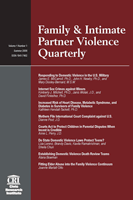Exploring Self-Defense for Women with Disabilities
Author: Michelle Ballan.; Molly Freyer.
Source: Volume 11, Number 02, Fall 2018 , pp.51-60(10)

< previous article |next article > |return to table of contents
Abstract:
There is an abundance of research suggesting that self-protective actions serve as an effective tool for women who are victims of intimate partner violence (IPV). Nonetheless, research on IPV and self-protection tends to exclude women with disabilities due to perceived physical or psychological limitations. Authors Michelle Ballan and Molly Freyer argue that self-protection training, when utilized in conjunction with other IPV support services, can contribute to feelings of safety and well-being for women with disabilities in intimate partner relationships. However, it is imperative that practitioners utilize comprehensive disability assessment tools to tailor self-protection strategies to meet the specific needs of the survivor. The authors also discuss current research and potential legal implications of self-protection.Keywords: Nonverbal methods of self-protection; nonviolent self-defense; self-defense in avoiding rape completion; harm-reduction; empowerment-focused classes; client assessment; safety planning
Affiliations:
1: Stony Brook Medical School; 2: Stony Brook University School of Social Welfare.